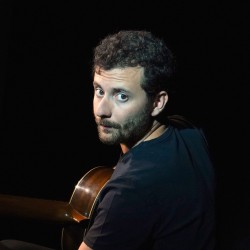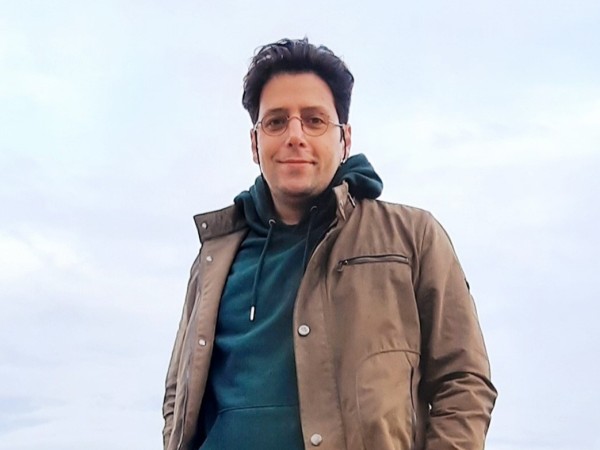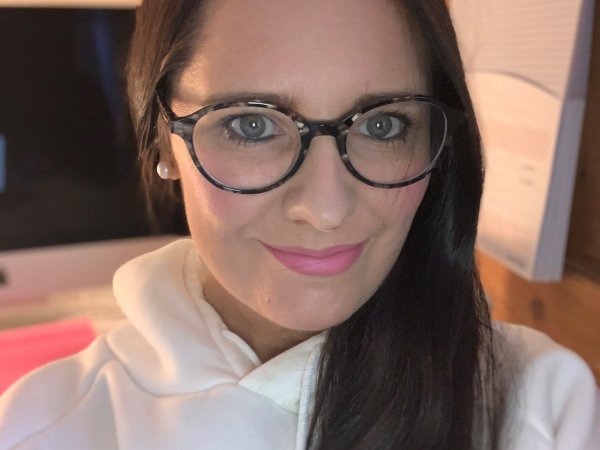
Giacomo Susani
"The University of Surrey and, specifically, its International Guitar Research Centre are internationally recognised as leading institutions for guitar research. Teachers and doctoral students together have created a lively community that consistently inspires and promotes research in the field of the guitar around the globe."
Course
Music (Composition) PhDEntry year
2021Research project
My research project explores the guitar as a compositional tool. It will result in a portfolio of newly composed music that intends to generate a new way of understanding the fretboard and its creative possibilities. It conducts research across a wide range of disciplines, including musical composition, performance and technology, as well as their cognitive implications. Alongside the composition portfolio, the outcomes of this research will also produce a set of recordings, musicological texts and newly built guitars in collaboration with a leading instrument-maker.
Why did you choose to come to Surrey?
The University of Surrey and, specifically, its International Guitar Research Centre (IGRC) are internationally recognised as leading institutions for guitar research. Teachers and doctoral students together have created a lively community that consistently inspires and promotes research in the field of the guitar around the globe. For a performer and composer such as me, who conducts research across these two disciplines and focuses on the guitar, it is an ideal place to exchange and foster new ideas.
What course(s) did you study before undertaking your PhD, and where did you study?
I studied guitar performance at the Conservatorio Arrigo Pedrollo in Vicenza (Italy) with Stefano Grondona and later moved to the UK to continue my studies at the Royal Academy of Music in London with Michael Lewin. There I completed my BMus, MA and Advanced Diploma. During my last year of studies I developed a portfolio of compositions for the guitar, including a guitar concerto, that became the basis for the research I am currently developing at the University of Surrey.
Since the beginning of my guitar studies, I also have been studying composition. My first teacher was Michele Brugnaro in Italy and later, my current supervisor, Stephen Goss, has advised and guided me throughout my composition work since I started at the Royal Academy of Music in 2014. Most recently I have been studying composition also with Italian composer Francesco Antonioni.
Why did you choose to study your PhD?
The guitar is a wonderful instrument, with a rich history and a great repertoire. Due to its intricate technology, however, it has encountered some resistance from composers in the past, who learned their craft by studying music on the keyboard. Instruments like the piano or organ organise and present sounds in a very specific way, which has been proven to affect the way musicians perceive and imagine music. This system of representation of pitches has dominated Western music for centuries: I chose to undertake my PhD as I argue that the guitar can enlighten an alternative way of thinking, imagining and experiencing sounds. My research explores the ways this is possible when composing new music, which is created from the analysis of the idiom of the fretboard.
Why are you passionate about your subject?
My professional activity as a concert guitarist and composer has brought me close to the subjects of my PhD on a daily basis ever since I can remember. These two activities (performing and composing) are part of my musical life and I feel they cannot be divided: they are two different perspectives of the same deep need for creative expression.
Which facilities or other resources have you used during your PhD?
Besides enjoying the great facilities and student services at the University of Surrey, I direct the guitar production of Barco Teatro, a beautiful theatre in the city of Padova (Italy), where I was born. Barco Teatro is gradually becoming a leading centre for guitar activity and research, by presenting an annual festival (the Homenaje Guitar Festival) and organising guitar concerts, conferences and masterclasses throughout the year. Everything we do there is greatly valuable to my research and closely aligns with the aims of the IGRC at Surrey.
How has your supervisor helped you to achieve your aims during your PhD studies?
Professor Stephen Goss, my lead supervisor, has been immensely helpful throughout my PhD studies and, more broadly, to my activity as a composer. His advice has always been on point, useful and constructive, and he has been consistently supporting my research activity.
How much opportunity has there been for collaboration during your PhD, either with researchers and academics at Surrey or with external organisations or companies?
"The process of exchanging ideas is always very inspiring and brings the final piece to otherwise unimagined results."
Collaboration is an essential part of my research. As a composer, every piece I have written for my PhD portfolio has been commissioned by external performers and institutions. The process of exchanging ideas is always very inspiring and brings the final piece to otherwise unimagined results. Among others I had the privilege of collaborating with David Russell, Nicolò Spera and the University of Colorado (Boulder, US) and Marco Ramelli.
My PhD is also producing new instruments, built by Italian luthier Gabriele Lodi. Our collaboration is greatly inspiring and brings a wide range of ideas to my research, which explore the interaction between abstract composition and its realisation on the instrument.
Finally, hearing about the other PhD students’ projects is very interesting. At Surrey we have many opportunities to present our projects to our peers and really get in touch with what our colleagues are developing in their specific fields.
How have you found your overall experience of studying for a PhD at Surrey?
My time at Surrey is greatly enjoyable and is running smoothly. I feel privileged to have the opportunity to study here.
Have you lived in University accommodation? If so, what is/was it like?
I live in London and therefore travel to Surrey only to attend meetings and research events. Although I am not there on a daily basis, I enjoy very much visiting and spending some quiet time by the lake, or take advantage of the library resources. For musicians, the Performing Arts Studio (PATS) is an amazing facility, with top recording equipment. Connections by train from London Waterloo to Guildford are extremely convenient and make it very easy to travel to the University without living on campus.
How do you think your time at Surrey has impacted your employability once you graduate?
Being already active as a performer and composer professionally, the experience at Surrey is definitely allowing me to expand my range of contacts and improve the quality of my composition work. The knowledge I am acquiring here gives me depth of reflection and introspection that I feel is making me grow intellectually and artistically. All the input that I am receiving at the University will definitely be extremely useful in the future, when applying for teaching positions or applying to present at international research conferences.

